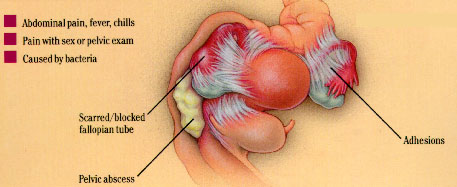Introduction
Infertility is the inability to produce children. It occurs in both men and women. A couple is considered infertile after having 12 months of unprotected sex without pregnancy. In women older than age 35, the time frame is reduced to 6 months.
One of the factors or conditions can reduce fertility is infectious diseases (including sexually transmitted infections); reproductive tract infections; mumps that develop after puberty in men. Sexually transmitted infections are a major cause of infertility. The 2 major causes of infertility related to STI are Gonorrhoea and Chlamydia infection to the genital tract. If left untreated, gonorrhoea and chlamydia can infect fallopian tubes, the uterus and ovaries. This is known as pelvic inflammatory disease (PID).
Clinical PID is painful, but sometimes PID has no symptoms and goes unnoticed (silent PID). Gonorrhoea and chlamydia can scar women’s fallopian tubes, blocking eggs from traveling down the tubes to meet sperm. Men can have scarring and blockage in the sperm duct (epididymis) and urethra from untreated gonorrhoea and chlamydia.
Types and its Symptoms
1. Chlamydia
Chlamydia is one of the most common STDs in Malaysia and is easily passed on during sex. Most people don’t experience any symptoms so are unaware they are infected.
In women, chlamydia can cause:
- Pain or a burning sensation when urinating.
- A vaginal discharge, pain in the lower abdomen during or after sex.
- Bleeding during or after sex, or between periods.
- Can also cause heavy periods.
In men, chlamydia can cause:
- Pain or a burning sensation when urinating.
- A white, cloudy or watery discharge from the tip of the penis.
- Pain or tenderness in the testicles.
It’s also possible to have a chlamydia infection in the anus, throat or eyes.
Diagnosis
Done with a urine test or by taking a swab of the affected area and sending for specialised test. The infection is easily treated with antibiotics, but can lead to serious long-term health problems if left untreated, including infertility.
2. Gonorrhoea
Gonorrhoea is a bacterial STD easily passed on during sex.
About 50% of women and 10% of men don’t experience any symptoms and are unaware they’re infected.
In women, gonorrhoea can cause:
- Pain or a burning sensation when urinating,
- A vaginal discharge (often watery, yellow or green).
- Pain in the lower abdomen during or after sex.
- Bleeding during or after sex or between periods.
- Sometimes causing heavy periods.
In men, gonorrhoea can cause:
- Pain or a burning sensation when urinating.
- A white, yellow or green discharge from the tip of the penis.
- Pain or tenderness in the testicles.
It’s also possible to have a gonorrhoea infection in your rectum, throat or eyes.
Diagnosis
Gonorrhoea can be easily diagnosed using a urine test, or by taking a swab of the affected area and sending for microscopy & culture. The infection is easily treated with antibiotics, but can lead to serious long-term health problems if left untreated, including infertility. Get tested for STIs at a sexual health clinic or clinic or your doctors.
Pelvic Inflammatory Disease (PID)
PID is an infection of the upper female genital tract, which includes the womb, fallopian tubes and ovaries. It is often the result of a sexually transmitted infection (STI). PID can damage and scar the fallopian tubes, making it virtually impossible for an egg to travel down into the womb.
Complications of Pelvic Inflammatory Disease
The fallopian tubes can become scarred and narrowed if they are affected by PID.
This can make it difficult for eggs to pass from the ovaries into the womb, which can increase your chances of having an ectopic pregnancy (a pregnancy in the fallopian tubes instead of the womb) in the future, and can make some women infertile.
It’s estimated that around 1:10 women with PID becomes infertile as a result of the condition, with the highest risk in women who have had delayed treatment or repeated episodes of PID. However, most women who are treated for PID will still be able to get pregnant without any problems. Sexually transmitted infections (STIs) are passed from one person to another through unprotected sex or genital contact.
References
- The international Planned Parenthood Federation Centres for Disease Control and Prevention, National Institute of Child Health and Human Development (NICHD).
| Last Reviewed | : | 5 December 2016 |
| Writer | : | Dr. Hj. Mohd Hatta bin Mohamed |
| Accreditor | : | Dr. Soon Ruey |








